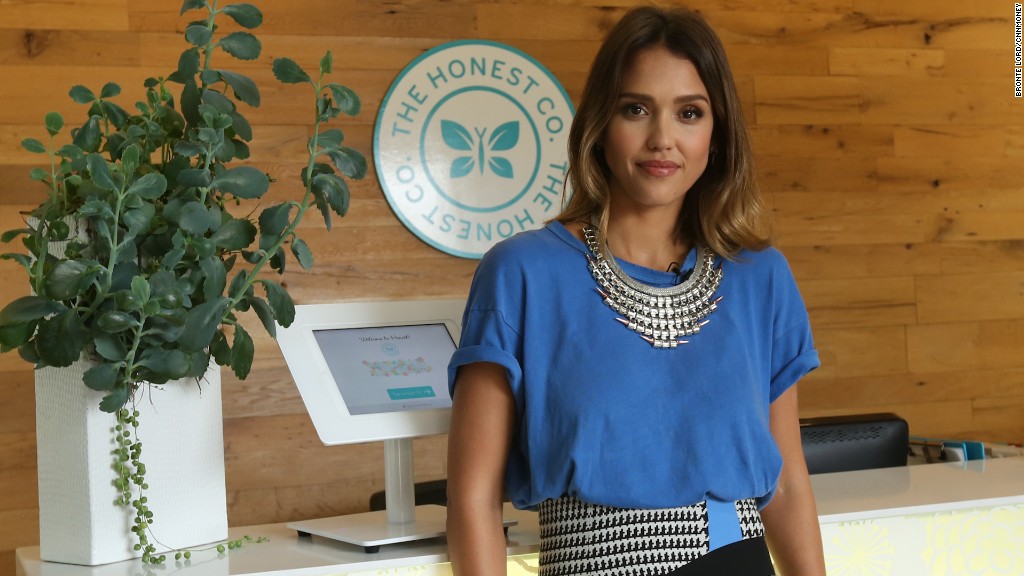
What's in a name? A boatload of problems, if you're The Honest Company.
Jessica Alba's Honest brand made its name by selling nontoxic, eco-friendly products to parents. Last week, the company agreed to pay $1.55 million to settle a nationwide class action lawsuit claiming it misled buyers about ingredients in its laundry detergent and dish soap.
The company continues to deny wrongdoing in that case. But it's one in a series of highly publicized lawsuits and recalls that has hurt the brand's image, experts say.
"To call something The Honest Company is a great marketing coup, but it [creates] some extra concern when things go wrong," said Andrew Gilman, the founder of CommCore Consulting Group, a crisis communications firm.
Alba, who has two daughters ages five and nine, founded The Honest Company in 2012 as a consumer products company that pairs smart design and with a growing market for organic products. The Playa Vista, California firm launched with 17 home products sold online only.
Now Honest has more than 100 products and hit $300 million in sales in 2016, according to the company. It's launched a line of natural cosmetics, and its products are available in a number of brick-and-mortar stores like Target (TGT) and Nordstrom (JWN).
But organic and natural goods are more expensive, and customers want to be sure that they're worth it. The detergent settlement, which stemmed from a Wall Street Journal investigation in March 2016, is just one example.
Related: If you bought Honest Company detergent, you could score a refund
In September 2015, the company was sued by a customer who said its sunscreen doesn't work and isn't really "natural." And in April 2016, the Organic Consumers Association filed a suit that alleged Honest baby formula contains ingredients that aren't really organic.
The baby formula case was dismissed by a judge in December. Claims about the company's sunscreen are still being litigated.
Even Honest admits the bad headlines take a toll.
"We know that there is an unprecedented amount of attention in both our company and our products and unlike many other companies, we live out every single moment in the press," Honest told CNNMoney via email.
Recalls have also been a problem of late. Last month, the company recalled baby wipes "out of an abundance of caution" after it detected mold in some packages. The company also recalled its baby powder in January over concerns it could cause "skin or eye infections."
Honest outsources the manufacturing of its products. "There's always risk when you're not in control of the production process, no matter how exacting your standards are," said Miro Copic, co-founder of brand strategy consultancy BottomLine Marketing.
Honest baby wipes are made in China, along with its dish towels and diaper caddies. The company's diapers are made by a U.S.-based company at a plant in Mexico.
Honest told CNNMoney that it looks for "best-in-class manufacturing partners," regardless of where they are located.
"We have teams in place that work closely with all of our partners to ensure that every part of the manufacturing process lives up to Honest standards," the company said.
Related: These $300 yoga pants are powered by machine learning
All of these mishaps can add up.
In August 2015, the company was valued at $1.7 billion after it raised $100 million from investors. Rumors abounded about an IPO.
That never materialized. Nor did a potential sale to consumer products behemoth Unilever, which the company was said to be exploring last September. Unilever (UL) scooped up competitor Seventh Generation instead.
"Both the recalls and the lawsuits hurt their ability to go public," Copic said.
In March, the company announced a major leadership shakeup, replacing founding CEO Brian Lee with Nick Vlahos, who was previously chief operating officer of Clorox (CLX).
Honest says its customers remain devoted. After all, the market for its products is hot. A 2015 Nielsen study found that organic baby food and formula sales were up 26%, while non-organic products dropped 6%.
But brand experts say there's a real risk that another gut punch could be crippling.
"Every time something happens, it's a nick," said Denise Lee Yohn, a consumer brands expert. "And then a nick becomes a cut and a cut becomes a wound."

